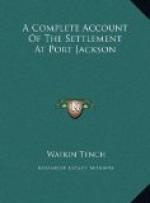Proceeded to the settlement called the Ponds, a name which I suppose it derived from several ponds of water which are near the farms. Here reside the fourteen following settlers.
-------------------------------------------------------
----------------------- Men’s names. | Trades. | Number of | Number of acres | | acres in each | in cultivation. | | allotment. | ------------------------------------------------------------
------------------ Thomas Kelly Servant 30 1 1/2 William Hubbard, and wife Plasterer 50 2 1/4 Curtis Brand, and wife Carpenter 50 3 John Ramsay, and wife Seaman 50 3 1/2 William Field —– 30 2 1/2 John Richards* Stone-cutter 30 ) 4 1/2 John Summers* Husbandman 30 ) ——Varnell —– 30 1 Anthony Rope**, and wife, and two children Bricklayer 70 1 Joseph Bishop, and wife None 50 1 1/2 Mathew Everingham, and wife Attorney’s clerk 50 2 John Anderson, and wife —– 50 2 Edward Elliot*** Husbandman 30 ) 2 Joseph Marshall*** Weaver 30 ) ------------------------------------------------------------
------------------
[They (Richards and Summers) cultivate in partnership.] [*A convict who means to settle here; and is permitted to work in his leisure hours.] [***They (Elliot and Marshall) cultivate in partnership.]
The Prospect Hill terms of settlement extend to this place. My private remarks were not many. Some spots which I passed over I thought desirable, particularly Ramsay’s farm; and he deserves a good spot, for he is a civil, sober, industrious man. Besides his corn land, he has a well laid out little garden, in which I found him and his wife busily at work. He praised her industry to me; and said he did not doubt of succeeding. It is not often seen that sailors make good farmers; but this man I think bids fair to contradict the observation. The gentleman of no trade (his own words to me) will, I apprehend, at the conclusion of the time when victualling from the store is to cease, have the honour of returning to drag a timber or brick cart for his maintenance. The little maize he has planted is done in so slovenly a style as to promise a very poor crop. He who looks forward to eat grapes from his own vine, and to sit under the shade of his own fig-tree, must labour in every country. He must exert more than ordinary activity. The attorney’s clerk I also thought out of his province. I dare believe that he finds cultivating his own land not half so easy a task as he formerly found that of stringing together volumes




